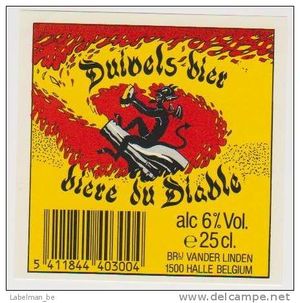Duivels Bier
Duivels Bier (also written Duivelsbier) is a historic beer from Halle (Hal in French) in the lambic family. Depending on the time period and producer, the production methods and characteristics of historic Duivels Bier would have varied. Around 1900 Duivels Bier was a spontaneously fermented beer with close similarities to lambic in both the characteristics of the final beer and in production methods. More recently Duivels Bier was a blend of lambic and top fermentation beer. Modern Duivels Bier is a top fermentation beer without lambic.

A Quick History of Duivels Bier
Duivels Bier originated in the town of Halle and for a time was a popular and a culturally important beer for Halle. Duivels Bier still retains a place in modern Halle culture for the yearly carnival. Lore places the origin of Duivels Bier in the 1700s as a spontaneously fermented brown beer [1] and confirmed producers exist as early as 1883 [2]. The name is reported to derive from pilgrims finding the beer more intoxicating than they had expected and exclaiming, as an excuse for their drunkenness, that the devil must have had a hand in the beer [3] (see also Hors Catégorie Brewing – Duivelsbier).
Duivels Bier was produced in Halle by Pêtre Freres from 1883 until the 1952, when the brewery closed. Brasserie Vander Linden, also from Halle, acquired the brand from Pêtre Freres and brewed the beer until the brewery closed in 2001 [4]. Vander Linden’s Duivels Bier, at least in its later years if not for the duration of its production, was a blend of top fermentation beer and lambic rather than a fully spontaneously fermented beer [3]. Brouwerij Boon acquired the brand from Vander Linden and began producing Duivels Bier in 2003 [4]. Boon’s Duivels Bier is a top fermentation beer without added lambic.
Brewing Historic Duivels Bier
Historic spontaneously fermented Duivels Bier would have been brewed following a similar approach to lambic of a similar time. Around 1900, the grist was made up of raw wheat (~50-55%) and malted barley (the remainder). As with historic lambic production, the beer was turbid mashed and one mash would have yielded two different worts: Duivels Bier and mars. The boil lasted at least 4 hours before the beer was cooled in a coolship and sent to wooden barrels for spontaneous fermentation. The beer was aged around 2 years in barrels [1].
Characteristics of Duivels Bier
Duivels Bier, in both the historic and the modern style, is an amber or brown beer of around 7-8% ABV (though recent versions such as Vander Linden’s were only 6% ABV). The color of historic Duivels Bier was described as being cognac-like. Historically the beer would have been firmly acidic with a comparable lactic character to lambic of the same time period Cite error: Invalid parameter in <ref> tag and the beer would have been sweetened with candi sugar shortly before serving. The taste profile of Duivels Bier in the early 1900s is described as being between traditional lambic and Flanders red/brown beers [1]. More recently Duivels Bier, for example as produced by Vander Linden, would have been a blend of top fermentation beer and lambic [3].
Certain special releases from modern lambic brewers and blenders share common ground with Duivels Bier in terms of color, strength, and production, and therefore possibly also taste profile. For example 3 Fonteinen Straffe Winter was an amber colored 8% spontaneously fermented beer with candi sugar which was aged for 2 years in barrels. Girardin's Dominicus also has overlap as an amber colored faro at 6% ABV, the same strength as Vander Linden’s Duivels Bier.
References
- ↑ Jump up to: 1.0 1.1 1.2 Petit Journal du Brasseur
- ↑ Biernet.nl page on Vander Linden
- ↑ Jump up to: 3.0 3.1 3.2 Annie Perrier-Robert and Charles Fontaine, Belgium by Beer - Beer by Belgium, 1996.
- ↑ Jump up to: 4.0 4.1 Biernet.nl page on Vander Linden